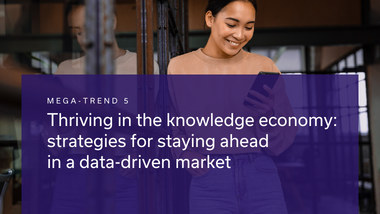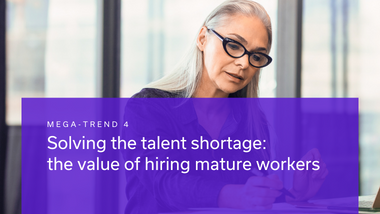6 workplace trends that will change the future of work for good

Sarah-Jane Walker, Operations Director shares six emerging trends employers need to consider to increase employee engagement and have more fulfilled and better performing teams.
With the most significant health crisis in our lifetimes catapulting us all at least ten years sooner than expected into a new world of remote working, the pros and cons of our new working world are constant talking points.
From virtual board meetings to socially distanced walks with friends – we are all constantly adapting to this ‘new norm’ and learning how to work differently. But the big question being asked is: ‘how is this going to play out and how can we plan ahead’?
From an employer’s perspective, the way to attract the best talent these days looks a whole lot different now. The things that people are looking for in a new employer have evolved significantly, across all generations. It’s no longer about the money, the flash offices, or the car allowance--it’s about culture, purpose and balance.
Here are some of the key emerging trends your company needs to focus on, if you want the most engaged, fulfilled and best performing teams out there:
- Recalibrate your culture
Company culture is now the number one thing that employees rate as the most important thing to look for in a new job. With the likes of Glassdoor giving your existing and potential future talent a version of how your workplace culture is perceived, the Covid-19 crisis has given firms the opportunity to recalibrate their company culture and adapt it to changing work practices. Companies that simply transfer their prior working practices to a virtual space without adapting to the new medium are seeing unintended negative consequences, such as video meeting fatigue.
Businesses need to be conscious of the cultures they are creating, how they treat their people and how they work with their customers. Our new remote environment means we now have the opportunity to broaden our talent pools, become more inclusive and truly create an environment to thrive. - Make collaboration feel like an occasion
Fancy lunch options, free parking, and on-site gyms don't carry any weight when attracting and retaining top talent as working from home has become the new norm. Now that commercial real estate sales are at an all-time low and many offices have been laid vacant for months, it’s no surprise that organisations are considering saving on expensive rent and moving to a permanent remote working model. Many leaders from all sizes of organisations are realising that business output hasn’t changed with the majority of their workforce working from home. So how do we plan for our future ‘offices’ and accommodate the 46% of people who had never worked from home before?
Create opportunities and spaces for meaningful collaboration. Strategy sessions, kick off calls, internal launch meetings have never been more anticipated or well attended. Having regular, well thought out and productive in-person sessions will not only allow employees to have that valuable social contact with their colleagues, it will create a massive power hub of energy, generate new ideas and help strengthen relationships between individuals who haven't been able to connect face-to-face for what feels like forever. - Redefine the 'work week'
Media mogul Richard Branson once said, “the key to success is a three-day workweek". With the effects of constant working from home meaning that we are ‘always connected’ to work, reducing the working week will be one of the future of work trends we will see evolve over the next few years. With today’s technology, there is no reason why people can’t work fewer hours and be equally, if not more effective. Four day weeks, nine day fortnights and the death of the nine to five will be the workplace shifts that will help people to find a better balance between their work and home lives, which right now have developed pretty huge ‘blurred lines’.
Branson also said, "it’s easier to attract top talent when you are open and flexible – it’s not effective or productive to force them to behave in a conventional way." Companies that are brave enough to advertise all of their roles as ‘fully flexible and remote’ will draw in the best candidates and gain loyal workforces. As innovation makes it possible to do more work in less time, it means employers should be able to give employees more personal time to do the things they want to do. - Facilitate social connection
Not having that ‘coffee machine chat’ and other informal interactions with colleagues and losing that community kind of feeling within our culture is sorely missed. Smart organisations are finding a way to reinvent these key social connections for their people.
From virtual breakfasts to cross-company ‘buddy’ systems, making sure individuals have the chance each day to socially ‘chat’ with someone other than their cat or family members is key to creating the work culture of the future. It’s far too easy to start switching off the Zoom camera or diving straight into meetings without spending that really important first minute to check in and see how everyone’s day has been.
Our calendars are now back-to-back, we rarely plan in lunch breaks, we don’t have travel time or even thinking time now. So ruthless diary management and making time to connect socially with colleagues should be a key priority to keep your people motivated and happy at work. - Facilitate a skills evolution
The pandemic has highlighted the need for evolving skills. 42% of the core skills required to perform existing jobs are expected to change by 2020. It’s estimated that on average 33% of the skills needed three years ago are no longer relevant. By 2030, there will be 133 million new roles emerging that will require people to move into new career paths. These new skillsets will not magically appear in emerging early careers talent, these future skills need to be identified for each organisation and a ‘build from within’ strategy will need to be developed.
Encouraging your employees to re-train and have varied careers that are made up with multiple assignments will not only help to retain talent, it will also build an environment that nurtures development and demonstrates your investment in people. - Better balance for better balance sheets
There has never been a stronger focus on employer brand - what a company stands for. Empathy and actions matter more than ever if you want to attract and keep great people within your organisation. Engaged and happy employees are your company’s most important assets and it’s apparent that the money and time invested in the development of employees and a positive company culture pays off.
Actions such as professional and personal development, improving your employees career experience and fostering greater levels of trust and transparency can all be linked to tangible economic impacts.
People and profits go hand in hand and paying attention to increasing organisational value through your employees is imperative, so create those ‘happiness indexes’. Find out from the ‘horse's mouth’ what would make people happier at work and make the changes you need to gallop into 2021 with your future of work plan firmly in place.
It's important to note that even though our new world of automation and innovation helps us to do things faster and more efficiently, people will always be your biggest and most important asset.
So do the right thing, create a clear understanding of what makes your people happy and productive in their jobs, set a culture which is open to evolve as the world continues to change our ways of working, be brave enough to make the changes you need and then you’re all set for whatever the future brings.











